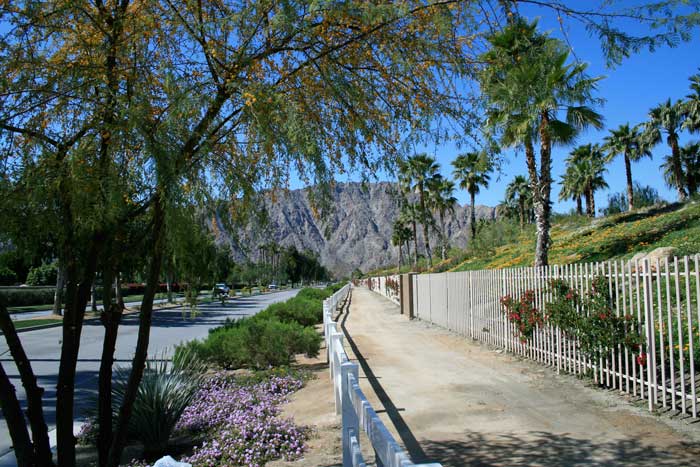by Sheri Dettman, Resort Lifestyle Realtor
People from outside the area often share with me their quandary regarding purchasing a home in the Palm Springs Real Estate area or in the Phoenix market.

Palm Trees & Golf Courses Abound
Both areas have abundant palm trees, golf courses, mild winters, beautiful desert mountains and many great communities to choose from. Phoenix has things Palm Springs doesn’t have and, of course, Palm Springs has amenities and activities which Phoenix does not offer. Before we invested in property here we did what most people do, we vacationed both here and in Phoenix.
If you are new to either area you’ll want to get out of the resort or rental home that you are enjoying and take a drive around. You’ll want to explore each area’s attractions, shopping, amenities, and, of course, you’ll want to consider traffic congestion and air quality, as well.

Market Overview
Palm Springs and Phoenix both offer attractive desert living, but their real estate markets have distinct characteristics:
Palm Springs:
- Median home price: $575,000 (up 10.6% year-over-year)
- Average days on market: 86
- Market description: Somewhat competitive
Phoenix:
- Median home price: $447,000 (up 1.6% year-over-year)
- Average days on market: 53
- Market description: Somewhat competitive
Population and Growth
Palm Springs:
- Population: Approximately 365,000 in the Coachella Valley
- Growth: Steady, with increasing interest from remote workers and retirees
Phoenix:
- Population: Over 4 million in the metropolitan area
- Growth: Rapid, with a 45.3% increase from 1990 to 2000
Housing Market Trends
Palm Springs:
- Inventory has increased to 548 units, up from 383 units a year ago
- Months of sales ratio: 5.0 months, indicating a market leaning towards buyers
- Detached homes selling at an average discount of 3.4%
Phoenix:
- Some homes receive multiple offers
- Hot homes can sell for around list price and go pending in about 25 days
- Average homes sell for about 2% below list price
Cost of Living Comparison
| Factor | Palm Springs | Phoenix |
| Median Income | $58,292 | $57,459 |
| Food & Groceries (National Avg) | 115.1 | 97.5 |
| Housing (National Avg) | 190.3 | 127.7 |
| Utilities (National Avg) | 106.5 | 102.7 |
| Transportation (National Avg) | 110.2 | 103.5 |
| Health (National Avg) | 93.5 | 94.7 |
Climate and Environment
Palm Springs:
- Average July high: 107°F
- Average January low: 45°F
- Air quality: Good
- Water quality: Excellent
- Proximity to beaches: 2 hours drive
Phoenix:
- Average July high: 106°F
- Average January low: 44°F
- Air quality: Moderate
- Water quality: Good
- Proximity to beaches: 7 hours drive
Lifestyle and Amenities
Palm Springs:
- Known for its rich cultural scene, art galleries, and events like the Palm Springs International Film Festival
- Thriving LGBTQIA+ community
- Smaller job market but growing opportunities in hospitality, healthcare, and remote work
Phoenix:
- Larger metropolitan area with more diverse job opportunities
- More flight options and transportation infrastructure
- Higher traffic congestion and air pollution concerns
Conclusion
While both Palm Springs and Phoenix offer desert living, they cater to different preferences. Palm Springs provides a more relaxed, small-town feel with a focus on culture and lifestyle, albeit at a higher cost of living. Phoenix offers a larger metropolitan experience with more affordable housing options but comes with increased congestion and environmental concerns.
Potential buyers should consider their priorities in terms of lifestyle, budget, and long-term investment when choosing between these two desert destinations.


